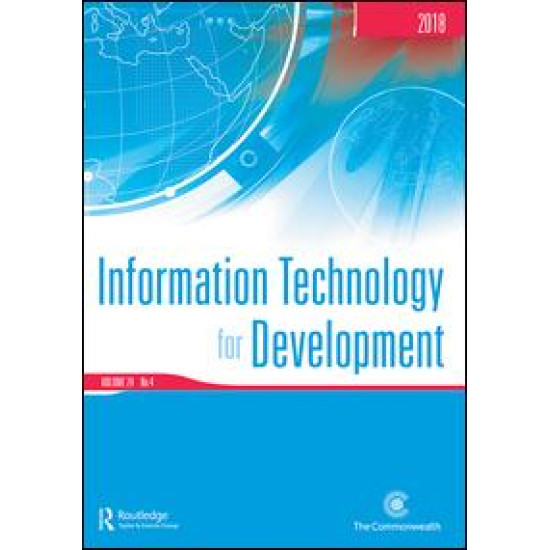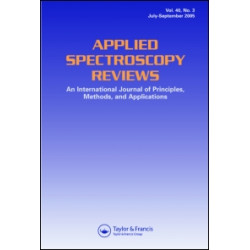
Information Technology for Development
Information Technology for Development, with an established record for publishing quality research and influencing practice, is the first journal to have explicitly addressed global information technology issues and opportunities. It publishes social and technical research on the effects of Information Technology (IT) on economic, social and human development. The objective of the Journal is to provide a forum for policy-makers, practitioners, and academics to discuss strategies and best practices, tools and techniques for ascertaining the effects of IT infrastructures in government, civil societies and the private sector, and theories and frameworks that explain the effects of IT on development. The concept of development relates to social, economic and human outcomes from the implementation of Information and Communication Technology (ICT) tools, technologies, and infrastructures.
The Journal addresses how to achieve significant, measurable improvements in addressing the Millennium Development Goals, Sustainable Development Goals through ICT: Strategies for sourcing goods and services; Best practices for working in different countries; Theories and frameworks that explain the effects of IT on development; and tools and techniques for ascertaining the effects of IT infrastructures in government, civil society, and the private sector.
The Journal accepts theoretical, empirical, and critical research using qualitative and/or quantitative methods that offer contributions to social, economic and/or human development outcomes in the following topics:
Development Issues
• IT ethics and development
• International legal frameworks
• IT and the global community
• Effect of mobile infrastructures on development
• IT and the emergence of the knowledge society
• International ICT dialogues and discourses
• ICT Implications for developed and transition economies
• Consultation and collaboration across the digital differences
• Adoption and diffusion of IT, and rate of uptake on development
• Security of network infrastructures, public key infrastructure
• Scalable infrastructures for development
• Attaining Millennium Development Goals through ICT
• Feasibility of Sustainable Development Goals
• Uptake of ICTs on micro-enterprises and their effect on the economy
Management of Sustainable Organizations
• Business models that enable innovations in ICTs to be applied in organizations
• Micro-enterprise Development through ICTs
• Digital innovations to create new organizational forms
• Entrepreneurial innovations in underserved communities and regions
• Innovative uses of mobile technologies for development
• Blockchain and open source software for smart contracts and telecommunications systems
• Data Analytics for achieving development outcomes
Health Informatics for Development
• Health Equity and use of ICTs for the equitable provision of healthcare
• Medical informatics and telehealth for underserved communities
• Mobile health (mHealth) for improving healthcare outcomes
• Innovations in bioinformatics for improving health outcomes
• Information for action in healthcare
• Health information systems for local and regional development
• Rural health infrastructures on improvements in people’s lives or sustainable development
• ICTs for community health and development
Open Development
• Sustainable Open Development Business Models and Ecosystems
• Peer production projects which include open source, citizen science, or crowdsourcing communities, where the community is driving product innovation
• Peer Production of Knowledge Goods
• Collective Intelligence, Action and Resources
• Open Science and Education
Electronic Government
• IT infrastructure for public administration and reform of legal frameworks
• Human resource development (HRD) frameworkss
• eGovernance for good government (eGovernment, eDemocracy and eBusiness)
• Small and Medium Enterprise (SME) access to public procurement systems
• Systems that promote Civic Engagement
• Social Networking for Civil Society
Global Information Systems (GIS)
• Focus on the strategic and operational advantages of including location and place as part of analytics and information systems in the ICT4D context
• Role of spatial information systems
• Metropolitan growth and GIS
• Technologies and concepts, as applied to management of information systems
• Business intelligence (BI)
• Decision support systems (DSS)
• Knowledge management (KM)
• Cloud technology and mobile solutions
Public Policy for the IT Industry
• Innovations in capacity building for ICT development (education in IT, skills for ICT development)
• IT strategies for development (national and sectoral)
• ICT and political development in transitional economies
• ICT standards and dependency
• Cyber-security
• Procurement: public procurement information systems, sourcing strategies
Information Technology for Development is the official journal of the Association for Information Systems (AIS) Special Interest Group on Global Development and is a publication of the Commonwealth Secretariat.
Peer Review Policy
All submitted manuscripts are subject to initial appraisal by the Editor. If found suitable for further consideration, papers are subject to peer review by independent, anonymous expert referees. Instructions for authors can be found here:
https://www.tandfonline.com/action/authorSubmission?journalCode=titd20&page=instructions
All peer review is double blind and submissions can be made online at http://mc.manuscriptcentral.com/itd.
Publishing Ethics
The Journal adheres to the highest standards of publishing ethics, with rigorous processes in place to ensure this is achieved. Taylor & Francis is a member of Committee of Publications Ethics (COPE) and utilises CrossCheck for all Journals. More information on our ethical standards and policies can be found here: http://authorservices.taylorandfrancis.com/ethics-for-authors/
The Journal has an appeals and complaints policy which can be viewed here: https://authorservices.taylorandfrancis.com/peer-review-appeals-and-complaints-from-authors/.
STAR
Taylor & Francis/Routledge are committed to the widest possible dissemination of its journals to non-profit institutions in developing countries. Our STAR initiative offers individual researchers in Africa, South Asia and many parts of South East Asia the opportunity to gain one month’s free online access to Taylor & Francis journals. For more information, please visit the STAR website.
The Journal addresses how to achieve significant, measurable improvements in addressing the Millennium Development Goals, Sustainable Development Goals through ICT: Strategies for sourcing goods and services; Best practices for working in different countries; Theories and frameworks that explain the effects of IT on development; and tools and techniques for ascertaining the effects of IT infrastructures in government, civil society, and the private sector.
The Journal accepts theoretical, empirical, and critical research using qualitative and/or quantitative methods that offer contributions to social, economic and/or human development outcomes in the following topics:
Development Issues
• IT ethics and development
• International legal frameworks
• IT and the global community
• Effect of mobile infrastructures on development
• IT and the emergence of the knowledge society
• International ICT dialogues and discourses
• ICT Implications for developed and transition economies
• Consultation and collaboration across the digital differences
• Adoption and diffusion of IT, and rate of uptake on development
• Security of network infrastructures, public key infrastructure
• Scalable infrastructures for development
• Attaining Millennium Development Goals through ICT
• Feasibility of Sustainable Development Goals
• Uptake of ICTs on micro-enterprises and their effect on the economy
Management of Sustainable Organizations
• Business models that enable innovations in ICTs to be applied in organizations
• Micro-enterprise Development through ICTs
• Digital innovations to create new organizational forms
• Entrepreneurial innovations in underserved communities and regions
• Innovative uses of mobile technologies for development
• Blockchain and open source software for smart contracts and telecommunications systems
• Data Analytics for achieving development outcomes
Health Informatics for Development
• Health Equity and use of ICTs for the equitable provision of healthcare
• Medical informatics and telehealth for underserved communities
• Mobile health (mHealth) for improving healthcare outcomes
• Innovations in bioinformatics for improving health outcomes
• Information for action in healthcare
• Health information systems for local and regional development
• Rural health infrastructures on improvements in people’s lives or sustainable development
• ICTs for community health and development
Open Development
• Sustainable Open Development Business Models and Ecosystems
• Peer production projects which include open source, citizen science, or crowdsourcing communities, where the community is driving product innovation
• Peer Production of Knowledge Goods
• Collective Intelligence, Action and Resources
• Open Science and Education
Electronic Government
• IT infrastructure for public administration and reform of legal frameworks
• Human resource development (HRD) frameworkss
• eGovernance for good government (eGovernment, eDemocracy and eBusiness)
• Small and Medium Enterprise (SME) access to public procurement systems
• Systems that promote Civic Engagement
• Social Networking for Civil Society
Global Information Systems (GIS)
• Focus on the strategic and operational advantages of including location and place as part of analytics and information systems in the ICT4D context
• Role of spatial information systems
• Metropolitan growth and GIS
• Technologies and concepts, as applied to management of information systems
• Business intelligence (BI)
• Decision support systems (DSS)
• Knowledge management (KM)
• Cloud technology and mobile solutions
Public Policy for the IT Industry
• Innovations in capacity building for ICT development (education in IT, skills for ICT development)
• IT strategies for development (national and sectoral)
• ICT and political development in transitional economies
• ICT standards and dependency
• Cyber-security
• Procurement: public procurement information systems, sourcing strategies
Information Technology for Development is the official journal of the Association for Information Systems (AIS) Special Interest Group on Global Development and is a publication of the Commonwealth Secretariat.
Peer Review Policy
All submitted manuscripts are subject to initial appraisal by the Editor. If found suitable for further consideration, papers are subject to peer review by independent, anonymous expert referees. Instructions for authors can be found here:
https://www.tandfonline.com/action/authorSubmission?journalCode=titd20&page=instructions
All peer review is double blind and submissions can be made online at http://mc.manuscriptcentral.com/itd.
Publishing Ethics
The Journal adheres to the highest standards of publishing ethics, with rigorous processes in place to ensure this is achieved. Taylor & Francis is a member of Committee of Publications Ethics (COPE) and utilises CrossCheck for all Journals. More information on our ethical standards and policies can be found here: http://authorservices.taylorandfrancis.com/ethics-for-authors/
The Journal has an appeals and complaints policy which can be viewed here: https://authorservices.taylorandfrancis.com/peer-review-appeals-and-complaints-from-authors/.
STAR
Taylor & Francis/Routledge are committed to the widest possible dissemination of its journals to non-profit institutions in developing countries. Our STAR initiative offers individual researchers in Africa, South Asia and many parts of South East Asia the opportunity to gain one month’s free online access to Taylor & Francis journals. For more information, please visit the STAR website.
₹56,133.00


















